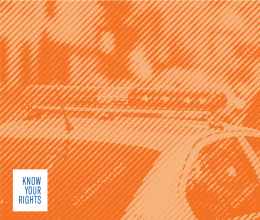
The Open Public Records Act (OPRA) is a statute that gives the public access to government records. I sat down with attorney CJ Griffin, vice president of the ACLU-NJ Board of Trustees and partner at Pashman Stein Walder Hayden P.C., where she is the director of the Stein Public Interest Center, to talk about how OPRA can be used to increase police accountability in New Jersey. CJ has been litigating matters of transparency and access to police records in New Jersey for nearly ten years and explained how government transparency affects all of us.
Q: What is the relationship between transparency and accountability?
A: Transparency can be critically important for preventing corruption, waste, and abuse. Presumably, if public officials know what they’re doing is going to be public, they will behave better. That’s the theory, especially in terms of financial transactions and police officer body camera footage and things like that.
For post-incident accountability, that’s really where it depends on the public. The Legislature and the courts can make records accessible, people can request them, but then it’s up to the people how they respond. Do they think it’s something that warrants an outcry? Or attending a public meeting? Or seeking a policy change? Of course, the press also plays an important role in keeping the public informed and flagging things we should be concerned about.
Q: How does New Jersey stack up against other states in terms of transparency laws?
A: When it comes to police records, we are at the back of the pack when you look at OPRA itself, which exempts most police records. If you factor in decisions from the New Jersey Supreme Court that have expanded access under the common law right of access, it elevates that ranking just a bit, but that common law right is difficult to enforce.
One way in which OPRA is superior to other state public records laws and the common law right of access is that it has a mandatory fee shifting mechanism. What that means is that if an agency unlawfully denies a request, the agency must pay the requestor’s legal fees if they sue and win access to the records. This enables the public to enforce their rights under OPRA, because no one should have to go to court and pay thousands of dollars in legal fees to obtain public records.
Attorneys like me handle OPRA cases on a contingency basis, meaning if I lose the case, then I don’t charge the requestor – I take the risk of non-payment, not the requestor. Because agencies know that they will have to pay the requestor’s legal fees if they lose in court, agencies are more likely to comply with the law so they don’t get sued.
One reason why it is so important to make police records subject to OPRA and not just the common law right of access is so OPRA’s fee shifting mechanism applies. This encourages police departments to produce their records. If they don’t, then the requestor could sue to access them and have their legal fees covered.
Under the common law, a requestor must prove that the public’s interest in disclosure outweighs the need for secrecy and there is no guaranteed right to attorneys’ fees. In fact, there is a case pending before the Supreme Court that might take any a trial judge’s discretion to award attorneys’ fees at all.
Q: To that point, you’ve been in front of the New Jersey Supreme Court several times litigating OPRA questions with regards to police misconduct – can you tell us more about the wins and losses in that arena and why they are important?
A: I’ve been practicing OPRA law for about ten years, and one of the first things I noticed was how police records were almost completely off limits to the public. It was clear this was an area that needed transparency and the degree of secrecy was shocking. Over the past decade, we’ve been trying to use litigation to expand transparency for police records in New Jersey.
Our first major win came in 2017 in a case called North Jersey Media Group v. Township of Lyndhurst, which involved the police having shot and killed an individual after a car chase in 2014. Our client, the newspaper, sought access to many different types of police records, including use of force reports that would document who the officers were and specifics about the type of force that was used. They also sought dashcam videos (at the time there were no body camera videos). The New Jersey Supreme Court issued a landmark decision that made the use of force reports and the names of the officers subject to OPRA. And for the dashcam videos, the court determined that although they were exempt under OPRA’s expansive exemptions for police records, they would be available under the common law right of access because there is such an important public interest in seeing videos of police shootings in particular.
This was the first decision that really expanded access, and as a result, so much activism and journalism has been done, like the Force Report database of five years of use of force reports at http://force.nj.com that allowed the public to see the significant racial disparities in how force was being used. They also analyzed more than 70,000 use of force reports and found which departments and officers used force more than others. The Force Report exposed that a Black person was three times more likely to face police force than a white person and in some cities, like Lakewood, that number was 22 times as likely. Prior to the Lyndhurst decision, that type of reporting and analysis was impossible.

